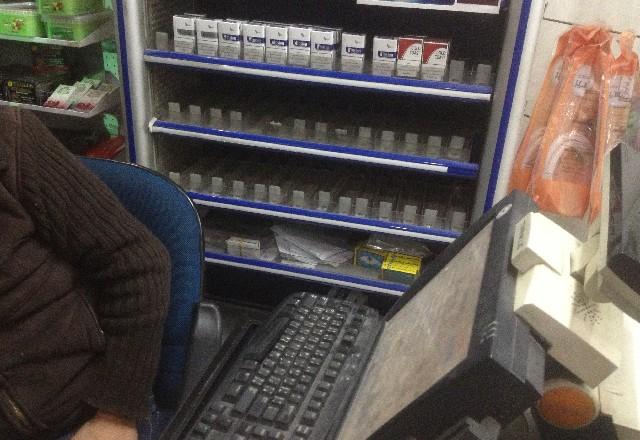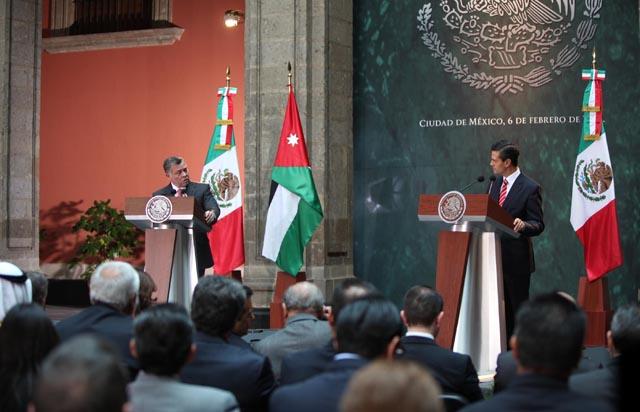AMMAN — His Majesty King Abdullah will start the second leg of his North American tour on Monday, according to a Royal Court statement.
His Majesty on Saturday concluded a working visit to Mexico during which he met with President Enrique Peña Nieto and senior officials and private sector leaders.
King Abdullah will meet on Monday with representatives of US-based Arab and Muslim organisations in Washington, DC.
He is scheduled to meet with several senior US officials in Washington, concluding the visit with a summit meeting with US President Barack Obama in California on February 14.
In Mexico, the King held talks with President Nieto on Friday that focused on bilateral ties and means to develop them in all areas, particularly at the economic level.
Discussions, which took place at the presidential palace, covered political developments in the Middle East, especially efforts geared towards bringing about peace between the Palestinians and the Israelis according to the two-state solution.
They also reviewed the situation in Syria and its repercussions on the region, said the statement.
The two leaders underlined their commitment to fostering cooperation between the two countries during a lunch banquet held in honour of the King and the accompanying delegation.
The King pointed out that the Kingdom enjoys a distinguished strategic location, serving as a linking point between Asia, Europe and Africa, in addition to enjoying stability, having qualified workers and being signatory to international and regional free trade agreements.
Regarding the situation in the Middle East, talks focused on efforts to bring about peace in light of the ongoing negotiations between Palestinians and Israelis.
King Abdullah underlined Jordan’s support for the current US-brokered negotiations, which are being held according to the two-state solution and the international resolutions, particularly the 2002 Arab Peace Initiative, arriving at the establishment of a viable and independent Palestinian state within the pre-1967 lines with East Jerusalem as its capital.
In relation to developments in Syria, the Monarch reiterated the Kingdom’s stance in supporting efforts to reach a comprehensive political solution to the crisis that ends bloodshed, citing burdens Jordan is enduring due to hosting a large number of Syrian refugees.
For his part, the Mexican president underscored his country’s commitment to develop cooperation with Jordan in all areas, voicing his appreciation for the King’s role in working to realise regional stability.
He stressed Mexico’s willingness to coordinate with the Kingdom to enable it to overcome challenges.
In press statements, the Monarch thanked the Mexican president and government for the “warm” welcome and hospitality.
“This visit affirms our eagerness to build friendship, understanding and cooperation between our two countries and also presents an opportunity to mark four decades of diplomatic relations, strengthen political cooperation and enhance economic ties between Jordan and Mexico,” said the King.
He added that the visit came in time Mexico is “ascending on the global scene”, stressing Jordan’s keenness to reach out to Mexico as a global partner in economic, educational, cultural and technical fields.
“In this regard, expediting the establishment of a comprehensive bilateral framework will help take our relations forward,” the King said.
King Abdullah also expressed his confidence that the visit would bolster economic cooperation between the private sectors in both countries through the exchange of business missions, tourism, investments and trade.
He indicated that Jordan’s stability, geo-strategic location, competitive advantages and free trade agreements offer Mexico a strategic gateway to access MENA markets and projects.
At the political level, King Abdullah said the talks underscored the two countries’ agreement on the centrality of the Arab-Israeli peace process, where a lasting solution to the Palestinian-Israeli conflict is the only way to achieving security and stability for all in the Middle East and beyond.
“I deeply appreciate Mexico as it stands with Jordan in its efforts to realise one of its highest priorities and interests to resolve the Palestinian-Israeli conflict, based on the two-state solution, and in accordance with UN resolutions and the Arab Peace Initiative,” he indicated.
The Monarch added that the meeting with Nieto allowed the two parties to amplify the international call for a political solution on the Syrian crisis, the importance of dialogue based on the Geneva Communiqué, Geneva I and the ongoing Geneva II process.
For his part, the Mexican president highlighted that the King’s visit was the first after nearly 40 years since the establishment of diplomatic relations between Jordan and Mexico.
He cited agreements signed between the two countries during the visit and their importance in fostering cooperation in the areas of education and culture, technical support and tourism.
The agreement on educational and cultural cooperation aims at increasing and supporting cooperation within the fields of education, arts, culture and sports by conducting activities that will contribute to a better understanding between the two countries.
The basic agreement on technical cooperation seeks to develop, promote and facilitate bilateral cooperation through designing and developing programmes and projects in the fields of tourism, agriculture, environment, health and energy.
In addition, the two countries signed memorandums of understanding on tourism, social security and health cooperation.
They also signed terms of reference for the negotiations of a free trade agreement between Mexico and Jordan, according to the statement.
















